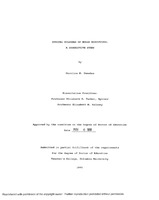Ethical dilemmas of nurse executives: A descriptive study
View File(s)
Visitor Statistics
Visits vs Downloads
Visitors - World Map
Top Visiting Countries
| Country | Visits |
|---|
Top Visiting Cities
| City | Visits |
|---|
Visits (last 6 months)
Downloads (last 6 months)
Popular Works for Camunas, Caroline by View
| Title | Page Views |
|---|
Popular Works for Camunas, Caroline by Download
| Title | Downloads |
|---|
View Citations
Citations
This research was designed to describe the ethical dilemmas and to identify the facilitating and inhibiting factors perceived by nurse executives when making decisions that have ethical implications. As there has been little research in this area the study was a descriptive study one. A questionnaire was sent to a nationwide random sample of 500 nurse executives who were members of the American Association of Nurse Executives (AONE). Because of the homogeneity of the group, statistical analysis yielded no significant differences. Content analysis of open-ended questions uncovered three major findings: (1) nurse executives experience dilemmas about a wide range of topics, (2) resources used to resolve dilemmas are varied and diverse, (3) dilemmas are experienced in many situations. In addition, it was found that the most important factors influencing decisions that have ethical implications were the superiors of the nurse executives and the politics within the institution. The most frequently encountered ethical dilemmas involved allocation of resources and quality of care issues. These were encountered in such different situations as short-term, long-term and strategic planning, performance appraisal, and other management functions. To resolve their dilemmas, nurse executives most frequently relied on their personal values and those of administrative and nursing colleagues. They used other resources when appropriate. Available resources seemed to be sufficient. The results have implications for nursing administration, nursing education, and staff development. They underscore the need to know more about ethical decision-making and moral reasoning as they relate to administration and organizational climate. Findings show a need for general ethics and ethical decision-making as well as bioethics to be taught at both graduate and undergraduate levels. Changing the dominate ethos of the profession from the traditional, idealized goal-driven model to a resource-driven model would help to reduce conflict for all nurses. The results also indicate that staff development should incorporate ethical management issues into its programs.
This dissertation has also been disseminated through the ProQuest Dissertations and Theses database. Dissertation/thesis number: 9136362; ProQuest document ID: 303941861. The author still retains copyright.
This item has not gone through this repository's peer-review process, but has been accepted by the indicated university or college in partial fulfillment of the requirements for the specified degree.
| Type | Dissertation |
| Acquisition | Proxy-submission |
| Review Type | None: Degree-based Submission |
| Format | Text-based Document |
| Evidence Level | Other |
| Research Approach | Qualitative Research |
| Keywords | Ethical Problems; Nurse Executives; Executive Decision Making |
| CINAHL Subject(s) | Decision Making, Ethical; Nurse Administrators; Organizational Politics; Health Resource Allocation; Quality of Health Care |
| Grantor | Teachers College, Columbia University |
| Advisor | Tucker, Elizabeth H. |
| Level | Doctoral-Other |
| Year | 1991 |
All rights reserved by the author(s) and/or publisher(s) listed in this item record unless relinquished in whole or part by a rights notation or a Creative Commons License present in this item record.
All permission requests should be directed accordingly and not to the Sigma Repository.
All submitting authors or publishers have affirmed that when using material in their work where they do not own copyright, they have obtained permission of the copyright holder prior to submission and the rights holder has been acknowledged as necessary.
Related items
Showing items related by title, author, creator and subjects.
-
Exploring ethical decision making in a global, interprofessional environment
McLaughlin, Mary Ann Siciliano; Romano, MichelleThis presentation combines research efforts of two studies -- phenomenological perspective of nurses transitioning into practice after interprofessional education, and a phenomenological study looking at ethics in nursing ... -
COVID-19 Resource: Ethical dilemmas facing nurses during the Coronavirus Crisis: Addressing moral distress
Mazanec, Polly M. (Sigma Theta Tau International, 2020)Nurses across the country are struggling with fears surrounding the impact of COVID-19 on patients, families and the health care system. Concerns about healthcare professionals’ safety, availability of proper protective ... -
A descriptive study of resources needed during floating among nurses in a tertiary pediatric facility
von Sadovszky, Victoria; Hoffman, Ann (2016-09-26)Session presented on Monday, September 19, 2016: Floating is a common occurrence in hospitals. Many anecdotal articles have been written about best practices and the experience of floating (Bates, 2013; Good & Bishop, ... -
Examining health-related decision making patterns of African Americans with coronary heart disease: A hermeneutic phenomenological study
Love, Tiffany AnnThe purpose of this study was to explore the themes that affected the day-to-day health-related decision making of African Americans managing coronary heart disease (CHD). Understanding the lived experience of African ... -
Moral decision making by neonatal intensive care nurses
Chally, Pamela S.Purpose. The purpose of this research was to gain information about the perspective neonatal intensive care nurses use to make moral decisions. Previous research in nursing has assumed ...





